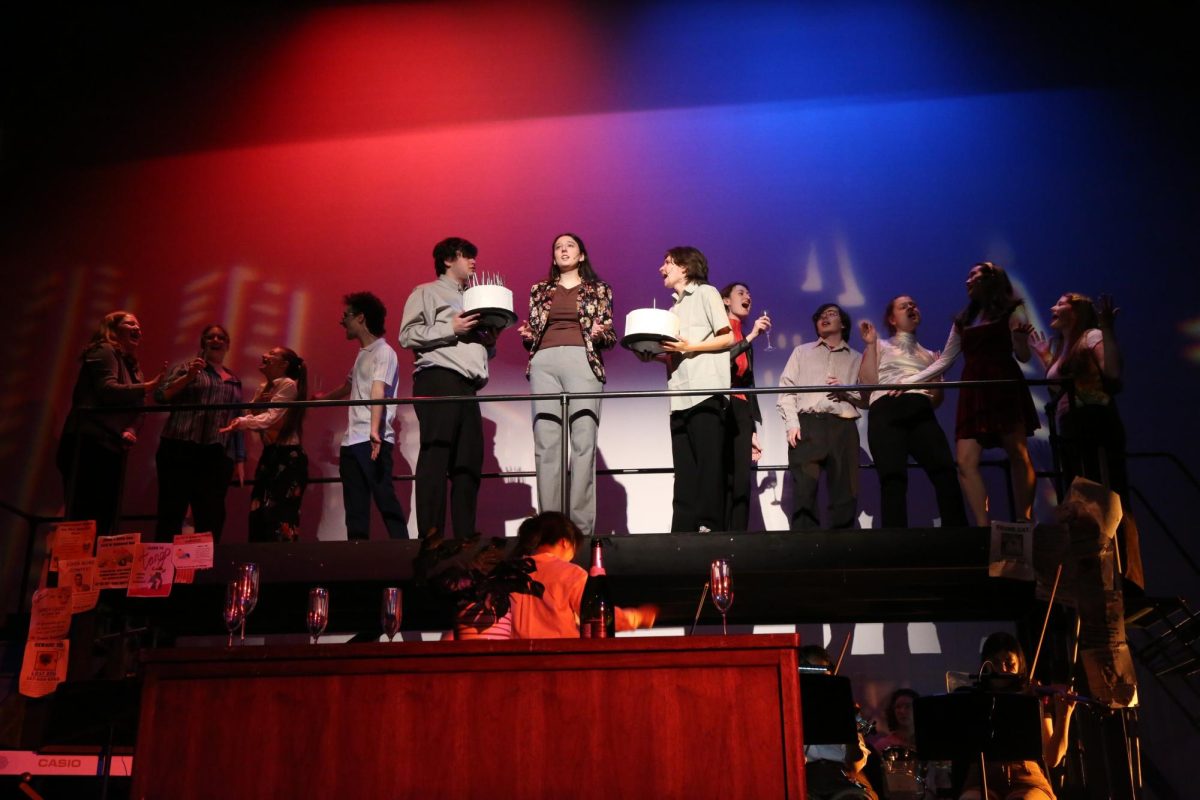Make a decision, take a side, choose a path; for better or for worse, the fast pace of life in the modern city is a constant motivator to make hard decisions before we ever feel sure or ready. The musical If/Then, recently performed by University Theater at the Logan Center, explores this contemporary issue through a split timeline, touching on work, friendship, love, and loss.
If/Then begins when 38-year-old Elizabeth (Joelle Singer Jensen), an ambitious and recently divorced city planner looking for a fresh start, moves back to her hometown of New York City and reacquaints herself with old friends. Torn (literally) between two different friends calling her different nicknames and competing for time with her, the story diverges: “Liz” joins Kate (Millie Walsh) in a search for love and romance, while “Beth” joins Lucas (Christian Beltran) at an activist meeting to make career connections. The grass is always greener, but neither timeline is a perfect pasture. Liz’s successful pursuit of romance begins to take its toll as she feels dissatisfied with her lack of career, while Beth’s successful career leads to romantic turmoil and feelings of unfulfillment.
After several off-putting dates, Liz meets Josh (Josh Winston), a surgeon and a soldier who wins her over soon after they start dating. Despite admitting to fears over the uncertain future of both their relationship and her career, Liz decides to take the leap with him anyways. In the other branch of the timeline, Beth uses her connection with Stephen (Nico Brown), an old classmate of hers in the Department of City Planning, to secure a job as deputy director. She soon finds a protégé in Elena (Julia Morales), a young and earnest intern, who serves as a dramatic foil to Beth. “She really loves working with Beth, but she has this other ambition that really is what takes precedence in her life in contrast to what took precedent in Beth’s life,” Morales told me, portraying Elena not necessarily as an ideal that Beth doesn’t measure up to but rather just another human with different priorities. This relationship ultimately underpins the musical’s message of encouragement and reassurance. As Morales told me, “The decisions that you make really do matter and could really change your life and the lives of the people who are around you,” and, in the end “things always work out.”
As the musical progressed, I found myself quickly drawn in by relatable characters and moving performances. Well-delivered moments of irony and comedy punctuate the play, from the painfully awkward and unlikeable dates Liz goes on to the cries of exasperation from a disgruntled subway rider amid frequent train delays. Rather than distracting from the stakes or drama of the play’s more serious moments and topics, these pockets of irony add personality and relatability to the production. When, for instance, society harshly exacts a price on Elizabeth for her ambitious pursuits (no matter what goal they were toward), the clever employment of humor cements a connection with the audience, validating identities of mundane plights.
Beyond the writing, the visual presentation of the musical was dynamic and engaging, particularly with regard to the lighting, which was used very effectively to emphasize the dramatic focus of any given scene. At one moment, that was through a spotlight in the dark, kicking off a scene by drawing all the attention to Stephen, alone on a balcony, clearing his schedule over the phone so Beth could get her big shot at a job with city planning. In the next scene, a dramatic clash of red and blue reflected diverging futures as Elizabeth faced proposal and pregnancy in both timelines—Liz both excited and anxious about a promising life with the man she loves and Beth gripped by horror and regret at the prospect of a future with the friend she just slept with for fun. Striking visuals like these both drove the plot home and made for a memorable experience that stuck with me long after the curtains were drawn.
Both Beth and Liz encounter different struggles and successes, often in exactly opposite areas of life. But when all is said and done, Elizabeth enjoys the highs and picks herself up from the lows, finding her way to what was meant for her no matter the timeline. Neither path is right or wrong—they are simply different, which is something we learn only in hindsight. Ultimately, this production’s message is one of inspiration and perseverance, offering some reassurance that, even in the bleakest moments, things can still turn out alright.









